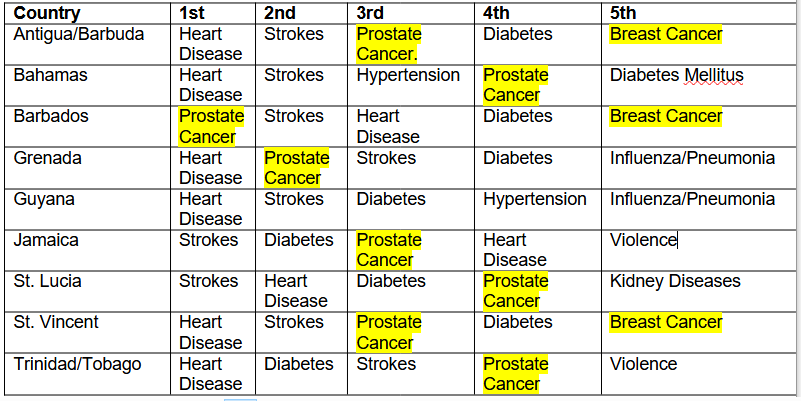Dr. C.V. Alert. MBBS, DM.
Family Physician.
Cancers are a group of non-communicable (ncds) diseases that have been simmering on the back burner of most Caribbean islands, while diabetes, hypertension and cardiovascular diseases share the spotlight. A closer look at the statistics suggests that this should not be the case.
Causes of Death, ranked.

When one reviews the five leading causes of death in English-speaking Caribbean countries, one sees prostate cancer and breast cancer often featuring on this list. In fact, as far as prostate cancer is concerned, of the top 12 countries in the world with the highest death rates from prostate cancer, nine English-speaking Caribbean countries appear on that list. By comparison, as far as breast cancer is concerned, only five Caribbean countries appear on the listing of top 12 countries with the highest rates. But this tells us that we do have high rates of prostate and breast cancers. The exact reason for this is unknown. Although less deadly than prostate and breast cancers, still seven Caribbean countries appear on the list of the top 12 countries with leading rates from cancer of the uterus. (Generally, more men die from prostate cancer that women die from breast and uterine cancers combined).
In Guyana, where a cancer does not appear in the top 5 causes of death, prostate cancer sits at position six, and breast cancer at position eleven.
However, we have recognized that some risk factors, if efforts of prevention are strenuously practiced, can significantly reduce one’s chances of developing these cancers. As an important second line of defense, early detection, though screening programs, offers an opportunity for early intervention and improve chances of long term survival. Many cancers are asymptomatic in early stages. That is why screening is needed: to detect these cancers before they spread, cause symptoms, and cause even more problems. Treatment can be curative if cancers are detected early.
More than half of cancer deaths worldwide being potentially preventable, prevention offers the most cost-effective and sustainable strategy for cancer control.
Some international researchers point to the escalating rates of obesity over the last few decades as an explanation for high cancer rates worldwide, and earlier onset cancers noted in some places. Caribbean countries have high obesity rates. On a related note, the change in dietary habits, with increased consumption of ultra-processed foods, and adopting more sedentary lifestyles may also be associated with high cancer rates. Others speculate that there may be environmental factors at play, such as carcinogens released into the air, water and food supplies.
Against this background persons are directed to their family physicians to determine what should be his/her appropriate screening schedule.
Guidelines from major medical organizations are based on what is recommended for people of average risk, and may not be applicable to Caribbean populations. Many of these guidelines are developed from studies that include few black people, so the study findings may not be applicable to Caribbean populations. People who are at average risk should follow the existing guidelines. This is one reason they should make sure to have an annual check-up with their family physicians. That is the time to review all the tests that they need to do, which includes cancer screenings. That is also the time to discuss whether their personal medical situation puts them at higher risk compared to average. This is a very important component of the visit, as these factors will determine whether they need to begin screenings at an earlier age than the general guidelines suggest, or if they need to be screened more frequently, or even need additional tests. Those with a family history of breast cancer or prostate cancer may need to start mammograms or PSA screening at an earlier age, or to have these tests more frequently.
For instance, if a woman has a sister, mother or other first-degree relative with breast cancer, they themselves have double the average risk of breast cancer. Someone who has two first-degree relatives has a five-fold increase in breast cancer incidence compared to average. It’s crucial for people to know their family history and share it with their family doctors, who could recommend additional next steps, such as genetic testing where available (not currently in the Caribbean, but some patients can afford such testing outside of the Caribbean). They may also need to start mammograms or other screening tests at an earlier age.
But startling statistics (from overseas) about the rise in cancer in younger people should be a call to action. Many cancers are asymptomatic in early stages. That is why screening is needed: to detect these cancers before they spread. Prostate and breast cancers both have easily assessable screening tests: the Prostate Specific Antigen (PSA) blood test, and the Mammogram, a radiological (x-ray) test. All adults should consult their family physicians about the optimal time to have these tests done.
Cancer prevention involves following the components of a healthy lifestyle: avoid all smoking, limit alcohol to moderate quantities (if at all), get adequate quantities of exercise and sleep, and exercise caution with your diet. And, as mentioned previously, knowing your family’s cancer history, and cancer screening tests, are the critical next steps.
